#Global Internet Forum
Explore tagged Tumblr posts
Text
Working to prevent and respond to the exploitation of digital platforms by terrorists and violent extremists.

Terrorist and violent extremist (TVE) groups are no longer necessarily organized in terms of identifiable organizations, but are increasingly diffused, decentralized – and, in some cases, even absent, as we see more individuals radicalize and mobilize without formal group or ideological affiliations.
GIFCT Strategic Plan 2025-2027 adopted
#Terrorist and violent extremist (TVE)#Tech against Terrorism#counter terrorism#victims of terrorism#Global Internet Forum#information-sharing
0 notes
Text
look, i love the character art for burrow's end, and i love seeing everyone's fanart of it. but i think we have to acknowledge that someone is a warrior cats stan.
#k talks#d20#dimension 20#burrow's end#and to be clear: i am not judging. i have no stones to cast#my first job (unpaid) was global moderator on the biggest warrior cats forum on the internet#(if you were on wcrpg back in the day: hi. are you okay)
59 notes
·
View notes
Text
In Costa Rica and Latvia today, the Atlantic Council is hosting its 360/OS Summit at RightsCon Costa Rica and NATO’s Riga StratCom. Among other things, the influential think tank will be previewing its “Task Force for a Trustworthy Future Web” report, which they hope will “lay the groundwork for stronger cross-sectoral ideation and action” and “facilitate collaboration now between the expanding community dedicated to understanding and protecting trust and safety.”
In human terms, conference attendees are discussing how best to stay on-brand by presenting the Censorship-Industrial Complex as a human rights initiative, and as #TwitterFiles documents show, they have the juice to pull it off.
EngageMedia (which I co-founded and was the long-time Executive Director) co-organized RightsCon in Manila in 2015, and I personally oversaw a lot of the preparations. That looks like a big mistake. I now believe RightsCon represents everything that has gone wrong in the digital rights field. Specifically, it represents the capture of a once-vibrant movement by corporate and government interests, and a broader shift towards anti-liberal and authoritarian solutions to online challenges. I left EngageMedia on good terms, but now have no formal relationship.
In honor of this week’s RightsCon and 360/OS Summit, we dug into the #TwitterFiles to revisit the integration of the Atlantic Council’s anti-disinformation arm, the Digital Forensic Research Labs (DFRLab), while also highlighting its relationship with weapons manufacturers, Big Oil, Big Tech, and others who fund the NATO-aligned think tank.
The Atlantic Council is unique among “non-governmental” organizations thanks to its lavish support from governments and the energy, finance, and weapons sectors. It’s been a key player in the development of the “anti-disinformation” sector from the beginning. It wasn’t an accident when its DFRLab was chosen in 2018 to help Facebook “monitor for misinformation and foreign interference,” after the platform came under intense congressional scrutiny as a supposed unwitting participant in a Russian influence campaign. Press uniformly described DFRLab as an independent actor that would merely “improve security,” and it was left to media watchdog FAIR to point out that the Council was and is “dead center in what former President Obama’s deputy national security advisor Ben Rhodes called ‘the blob.’”
What’s “the blob”? FAIR described it as “Washington’s bipartisan foreign-policy consensus,” but thanks to the Twitter Files, we can give a more comprehensive portrait. In the runup to the 360/OS event in that same year, 2018, Graham Brookie of the Atlantic Council boasted to Twitter executives that the attendees would include the crème de la crème of international influence, people he explained resided at the “no-kidding decision-maker level”:
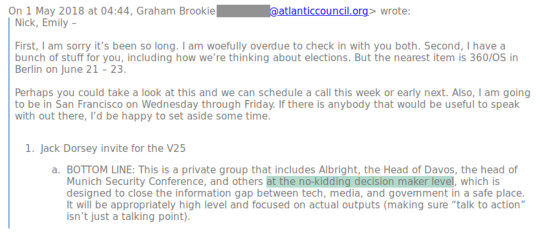
Similar correspondence to and from DFRLab and Twitter outlined early efforts to bring together as partners groups that traditionally served as watchdogs of one another. Perhaps more even than the World Economic Forum meetings at Davos or gatherings of the Aspen Institute in the US, the Atlantic Council 360/OS confabs are as expansive a portrait of the Censorship-Industrial Complex as we’ve found collected in one place.
In October 2018, DFRLab was instrumental in helping Facebook identify accounts for what became known as “the purge,” a first set of deletions of sites accused of “coordinated inauthentic behavior.” Facebook in its announcement of these removals said it was taking steps against accounts created to “stir up political debate,” and the October 2018 “purge” indeed included the likes of Punk Rock Libertarians, Cop Block, and Right Wing News, among others. Even the progressive Reverb Press, founded by a relatively mainstream progressive named James Reader, found his site zapped after years of pouring thousands of dollars a month into Facebook marketing tools. “That’s what sticks in my craw. We tried to do everything they suggested,” Reader said then. “But now, everything I worked for all those years is dead.”
In the years since, DFRLab has become the central coordination node in the Censorship Industrial Complex as well as a key protagonist in the Election Integrity Partnership and the Virality Project. Its high-profile role at RightsCon, the biggest civil society digital rights event on the calendar, should concern human rights and free expression activists.
According to their London 2019 event “360/OS brings together journalists, activists, innovators, and leaders from around the world as part of our grassroots digital solidarity movement fighting for objective truth as a foundation of democracy.” Their Digital Sherlocks program aims to “identify, expose, and explain disinformation.” But DRFLabs are more Inspector Gadget (or double agents) than Sherlock Holmes. The Twitter Files reveal DFRLab labeled as “disinformation” content that often turned out to be correct, that they participated in disinformation campaigns and the suppression of “true” information, and that they lead the coordination of a host of actors who do the same.
Twitter Files #17 showed how DFRLab sent Twitter more than 40,000 names of alleged BJP (India’s ruling nationalist party) accounts that they suggested be taken down. DFRLab said it suspected these were “paid employees or possibly volunteers.” However as Racket’s Matt Taibbi noted, “the list was full of ordinary Americans, many with no connection to India and no clue about Indian politics.” Twitter recognized there was little illegitimate about them, resulting in DFRLab pulling the project and cutting ties with the researcher.
Twitter Files #19 further revealed DFRLab was a core partner in the Election Integrity Partnership (EIP), which “came together in June of 2020 at the encouragement of the U.S. Department of Homeland Security’s Cybersecurity and Infrastructure Security Agency, or CISA” in order to “fill the gaps legally” that government couldn’t. As a result, there are serious questions as to whether the EIP violated the US First Amendment.
DFRLab was also a core partner on the Virality Project, which pushed its seven Big Tech partners to censor “stories of true vaccine side-effects.” The Stanford Internet Observatory, which led the project, is now being sued by the New Civil Liberties Alliance for its censorship of “online support groups catering to those injured by Covid vaccines.” Debate as to the frequency of serious adverse events is ongoing, however. The German health minister put it at 1 in 10,000, while others claim it is higher.
The Virality Project sought to suppress any public safety signals at all. The Stanford Internet Observatory is also at the moment reportedly resisting a House Judiciary Committee subpoena into its activities.
TwitterFiles #20 revealed some of the Digital Forensic Lab’s 2018 360/0S events, which brought together military leaders, human rights organizations, the Huffington Post, Facebook and Twitter, Edelman (the world’s biggest PR firm), the head of the Munich Security Conference, the head of the World Economic Forum (Borge Brende) a former President, Prime Minister and CIA head, intel front BellingCat and future Nobel Peace Prize winner Maria Ressa, all to combat “disinformation.” We can now reveal more.
Introducing the Atlantic Council
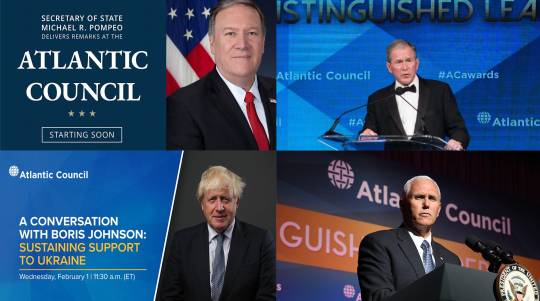
The Atlantic Council is a NATO-aligned think tank established in 1961. Its board of directors and advisory board are a Who’s Who of corporate, intelligence and military power, including:
James Clapper – former Director of National Intelligence whose tenure included overseeing the NSA during the time of the Snowden leaks. Asked whether intelligence officials collect data on Americans Clapper responded “No, sir,” and, “Not wittingly.” Clapper also coordinated intelligence community activity through the early stages of Russiagate, and his office authored a key January 2017 report concluding that Russians interfered in 2016 to help Donald Trump. Clapper has been a 360/OS attendee.
Stephen Hadley, United States National Security Advisor from 2005 to 2009 (also a 360/OS attendee)
Henry Kissinger, former US Secretary of State who oversaw the carpet bombing of Vietnam, among other crimes against humanity
Pfizer CEO Anthony Bourla
Stephen A. Schwarzman, Chairman, CEO, and Co-Founder, The Blackstone Group
Meta’s President for Global Affairs, Nick Clegg
Richard Edelman, CEO of the world’s largest PR firm (and 360/OS attendee)
The Rt. Hon. Lord Robertson of Port Ellen, Former Secretary General of NATO
Ambassador Robert B. Zoellick, Former President of the World Bank
Leon Panetta, former US Secretary of Defense & CIA Director. Panetta oversaw the US’s massive growth in drone strikes.
John F. W. Rogers. Goldman Sachs Secretary of the Board
Chuck Hagel, chairman of the Council, sits on the board of Chevron and is also a former US Secretary of Defence.
The Atlantic Council raised $70 million in 2022, $25 million of which came from corporate interests. Among the biggest donors were: the US Departments of Defense State, Goldman Sachs, the Rockefeller Foundation, Craigslist founder Craig Newmark, Google, Crescent Petroleum, Chevron, Lockheed Martin, General Atomics, Meta, Blackstone, Apple, BP, eBay founder Pierre Omidyar, Raytheon, ExxonMobil, Shell, Twitter, and many more. Ukraine’s scandal-ridden energy company, Burisma, whose links to Hunter Biden were suppressed by the August 2020 table-top exercise coordinated by the Aspen Institute, also made a contribution. You can view the full 2022 “honor roll” by clicking here.
The Atlantic Council is the Establishment, though many suffer from the delusion that in putting on a “Digital Sherlock” cape, they’re somehow with the rebel alliance. The opposite is true. The Atlantic Council and DFRLab don’t hide their militarist affiliations. This week’s OS/360 event at RightsCon Costa Rica runs together with a 360/OS at NATO’s Riga StratCom Dialogue, which DFRLab note they have “worked closely with” “since 2016.”
The Birth of the Digital Forensic Research Lab
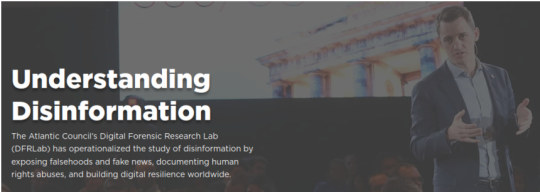
DFRLab was founded in 2016, and has been a major catalyst in expanding the “anti-disinformation” industry. Among non-governmental entities, perhaps only the Aspen Institute comes close to matching the scope, scale and funding power of DFRLab. DFRLab claims to chart “the evolution of disinformation and other online and technological harms, especially as they relate to the DFRLab’s leadership role in establishing shared definitions, frameworks, and mitigation practices.”
Almost $7 million of the Atlantic Council’s $61 million spent last year went to the DRFLabs, according to their 2022 annual financial report. Through its fellowship program, it has incubated leading figures in the “disinformation” field. Richard Stengel, the first director of the Global Engagement Center (GEC), was a fellow. GEC is an interagency group “within” the State Department (also a funder of the Atlantic Council), whose initial partners included the FBI, DHS, NSA, CIA, DARPA, Special Operations Command (SOCOM), and others. GEC is now a major funder of DFRLab and a frequent partner:
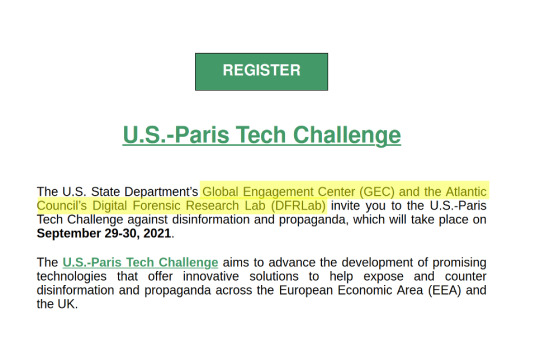
In this video, Stengel says, “I’m not against propaganda. Every country does it, they have to do it to their own population, and I don’t think it’s that awful.”
Stengel was true to his word, and apart from DFRLab, the GEC funded the Global Disinformation Index, which set out to demonetize conservative media outlets it claimed were “disinformation.” (See 37. in the censorship list) He thought the now-disgraced Hamilton68 was “fantastic.” In total, GEC funded 39 organizations in 2017. Despite Freedom of Information requests, only 3 have been made public to date. Roughly $78 million of GEC’s initial $100 million budget outlay for fiscal year 2017 came from the Pentagon, though the budgetary burden has shifted more toward the State Department in the years since.
The Global Engagement Center was established in the last year of Barack Obama’s presidency, via a combination of an executive order and a bipartisan congressional appropriation, led by Ohio Republican Rob Portman and Connecticut Democrat Chris Murphy. The GEC was and remains virtually unknown, but reporting in the Twitter Files and by outlets like the Washington Examiner have revealed it to be a significant financial and logistical supporter of “anti-disinformation” causes.
Though tasked by Obama with countering “foreign state and non-state propaganda and disinformation efforts aimed at undermining United States national security interests,” its money has repeatedly worked its way back in the direction of policing domestic content, with Gabe Kaminsky’s Examiner reports on the GDI providing the most graphic example.
GEC frequently sent lists of “disinformation agents to Twitter.” Yoel Roth, former head of Trust and Safety referred to one list as a “total crock.” Roth is now a member of DFRLab’s Task Force for a Trustworthy Future Web. Let’s hope he brings more trust than Stengel. You can read more on GEC’s funding here.
Other DFRLab luminaries include Simon Clark, Chairman of the Center for Countering Digital Hate (a UK “anti-disinformation” outfit that aggressively deplatforms dissidents), Ben Nimmo (previously a NATO press officer, then of Graphika (EIP and the Virality Project partners) and now Facebook’s Global Threat Intelligence Lead), and Eliot Higgins of Bellingcat. Bellingcat has an ominous reputation, which it’s earned in numerous ways, including its funding by the National Endowment for Democracy (see Glenn Greenwald’s recent report and Aaron Maté’s here). Most recently, Bellingcat assisted in the arrest of the 21-year-old Pentagon leaker, further speeding up the abandonment of the Pentagon Papers Principal where the media protected, rather than persecuted, leakers. Bellingcat was part of 360/OS backroom meetings with former intel chiefs, the head of Davos and the Munich security conference among many others, as we will see soon.
As noted in the introduction, DFRLab itself has made several wrong calls on “disinformation.” In one report they highlighted “outright false narratives,” which focused mainly on the notion that Covid was an engineered bioweapon, but lumped in the “unverified” claim Covid was the “result of a lab accident.” A lab accident is now the preferred hypothesis of the US Department of Energy, the FBI, and many others. To the DFRLab it was “disinformation” and a “conspiracy theory.”
The Election Integrity Partnership and the Virality Project
DFRLab were core partners on two of the most influential “anti-disinformation” initiatives of recent times.
The Virality Project built on the EIP and had partnerships with Twitter, Facebook, Instagram, Youtube, Google, TikTok and more to combat vaccine “misinformation.” Stanford and DFRLab partnered with the University of Washington’s Center for an Informed Public, Graphika, NYU Tandon School of Engineering and Center for Social Media and Politics, and the National Congress on Citizenship. Through a shared Jira ticketing system they connected these Big Tech platforms together, with Graphika using sophisticated AI to surveil the online conversation at scale in order to catch “misinformation” troublemakers.
VP went far beyond any kind of misinformation remit, most infamously recommending to their Big Tech partners that they consider “true stories of vaccine side effects” as “standard misinformation on your platform.”

A Virality Project partner called the Algorithmic Transparency Initiative (a project of the National Congress on Citizenship) went further. Their Junkipedia initiative sought to address “problematic content” via the “automated collection of data” from “closed messaging apps,” and by building a Stasi-like “civic listening corps,” which in recent years has taken on a truly sinister-sounding mission. The current incarnation might as well be called “SnitchCorps,” as “volunteers have an opportunity to join a guided monitoring shift to actively participate in monitoring topics that disrupt communities”:
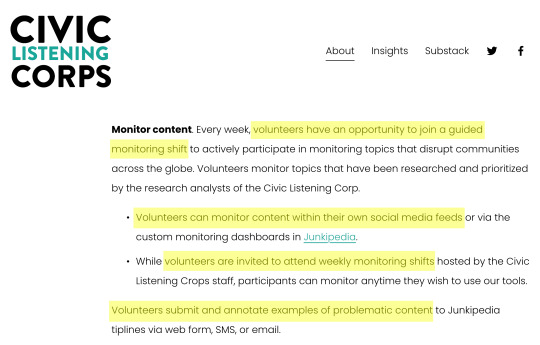
Garret Graff, who oversaw the Aspen Hunter Biden table-top exercise, was chairman of that same National Congress on Citizenship when they collaborated on the Virality Project. Both EIP and VP were led by Renee DiResta of the Stanford Internet Observatory, a former CIA fellow who engineered the now disgraced New Knowledge initiative, which developed fake Russian bots to discredit a 2016 Alabama senate race candidate, as acknowledged by the Washington Post. You can read Racket’s previous work on the Virality Project here.
DFRLab are the elite of the “anti-disinformation” elite. They work closely with a wide range of actors who have participated in actual disinformation initiatives. Here they’re invited to an elite Twitter group set up by Nick Pickles of “anti-disinformation” luminaries First Draft, also participants in the Hunter Biden laptop tabletop, and the Alliance for Security Democracy, part of the RussiaGate Hamilton68 disinformation operation.
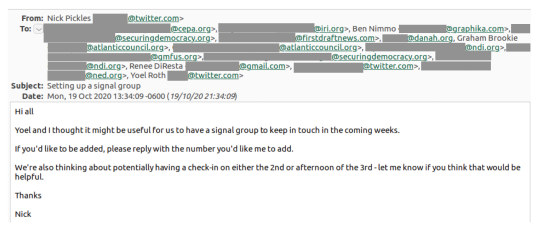
360/OS
The 360/OS event marries this tarnished record with the financial, political, military, NGO, academic and intelligence elite. Some of this is visible through publicly available materials. Twitter Files however reveal the behind the scenes, including closed door, off-the-record meetings.
“I’ve just arrived in Kyiv” Brookie notes in 2017, as he seeks to line up a meeting with Public Policy Director Nick Pickles as they discuss Twitter providing a USD $150K contribution to OS/360 (seemingly secured), and to garner high level Twitter participation.
Pickles is visiting DC and Brookie suggests he also meet with the GEC and former FBI agent Clint Watts of Hamilton 68 renown. “Happy to make those connections,” he chimes.
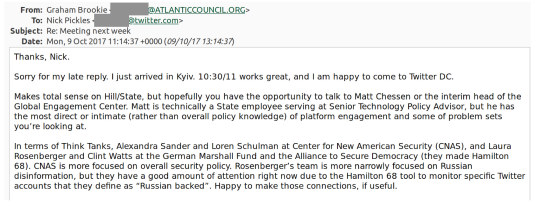
360/OS events are elite and expensive — $1 million according to Brookie — so closer collaboration with Twitter, especially in the form of funding, is a high priority.

Twitter offers $150,000:
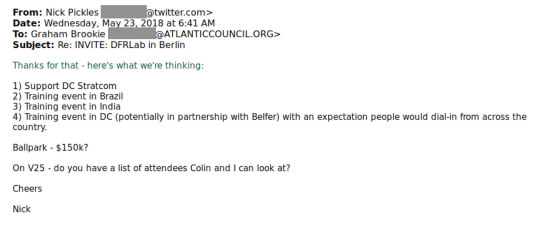
When Brookie mentions the attendees at the “no-kidding decision maker level” he isn’t kidding. Parallel to the 360/OS public program is the much more important off-the-record meeting of “decision makers ranging from the C-Suite to the Situation Room.” Here, he is explicit about a convening of military and financial power. Vanguard 25 is presented as a way to “create a discreet and honest way to close the information gap on challenges like disinformation between key decision makers from government, tech, and media.”

The document boasts of its high-level participants:

More are revealed in email exchanges, including Madeleine Albright and the head of the WEF:

They go on to list a bizarre mishmash of media leaders, intelligence officials, and current or former heads of state:

It appears Germany’s Angela Merkel was out of reach in the end, but many of the others attended this behind the scenes meeting on “disinformation.” Who are they?
Matthias Dopfner – CEO and 22% owner of German media empire Axel Springer SE, the biggest media publishing firm in Europe
Borge Brende – head of the World Economic Forum and former Norwegian foreign minister
Toomas Hendrick Ilves – former President of Estonia who co-chairs the World Economic Forum’s Global Futures Council on Blockchain Technology. Hendrick is also a fellow at the Freeman Spogli Institute for International Studies (where the Stanford Internet Observatory is housed) and is on the advisory council of the Alliance for Securing Democracy, of Hamilton 68 renown.
Chris Sacca – billionaire venture capitalist
Mounir Mahjoubi – previously Digital Manager for President Macron’s presidential campaign, and former Chairman of the French Digital Council
Reid Hoffman – billionaire and Linkedin co-founder
Ev Williams – Former CEO of Twitter and on the Twitter board at the time
Kara Swisher – New York Times opinion writer, who founded Vox Media Recode
Wolfgang Ischinger - Head of the Munich Security Conference
Aleksander Kwasniewski – Former President of Poland. Led Poland into NATO and the EU.
Richard Edelman – CEO of the largest PR company in the world
Elliot Shrage – previously Vice-President of Public Policy at Facebook (DFRLab had election integrity projects with Facebook)
Lydia Polgreen – Huffington Post Editor in Chief
Jim Clapper – former US Director of National Intelligence
Maria Ressa – co-founder of Rappler and soon to be winner of the Nobel Peace Prize
JK Rowling was also invited to give an award, though appears she didn’t make it in the end:

Why would such a group all gather specifically around the question of “disinformation”? Is disinformation truly at such a level that it requires bringing together the world’s most popular author with military and intelligence leaders, the world’s biggest PR company, journalists, billionaires, Big Tech and more? Or is this work to build the case that there is a disinformation crisis, to then justify the creation of a massive infrastructure for censorship? A glimpse of the agenda offers clues:

Here the head of the most important military and intelligence conference in the world (Munich) sits down in a closed door meeting with a former Secretary of State and the Executive Vice-Chair of the Atlantic Council.

Which is followed by a closed door session with the Editor-in Chief of the now-defunct Huffington Post and peace-maker Maria Ressa who presented to the same group of military, intelligence, corporate and other elites. Is the role of a journalist and Nobel laureate to work behind closed doors with militarists and billionaires, or to hold them to account?
At 2022’s OS/360 at RightsCon Ressa conducted a softball interview on disinformation with current US Secretary of State Anthony Blinken. In testimony last April 2023, former CIA deputy director Michael Morrell stated that Blinken “set in motion the events that led to the issuance of the public statement” by more than 50 former intelligence officials that the Hunter Biden laptop had “all the classic earmarks of a Russia information operation.”
The Twitter Files also revealed that in August 2020 the Aspen Institute organized a table-top exercise to practice how best to respond to a “hack and leak” of a Hunter Biden laptop. The laptop only came to light however two months later. In attendance was First Draft (now the Information Futures Lab), the New York Times, Washington Post, Rolling Stone, CNN, Yahoo! News, Facebook, Twitter and more. Here, DFRLab head Graham Brookie speaks with the Aspen Institute’s Garret Graff, who coordinated the Hunter Biden tabletop exercise.
After it turned out the Hunter Biden laptop was real, and the disinformation operation was more appropriately described as having been led by the likes of Blinken and the Aspen Institute. The appropriate response is apparently for RightsCon, DFRLab, Blinken and Ressa to put on a nice forum to promote these figures as “anti-disinformation” leaders.
youtube
Former DFRLab fellow and intel front Bellingcat founder Eliot Higgins is also invited to the closed door sessions with a former head of the CIA, a former Prime Minister and a President. How do you keep power accountable when you are in the same cozy club? This theme runs throughout. Bellingcat is featured heavily at the public sessions also:
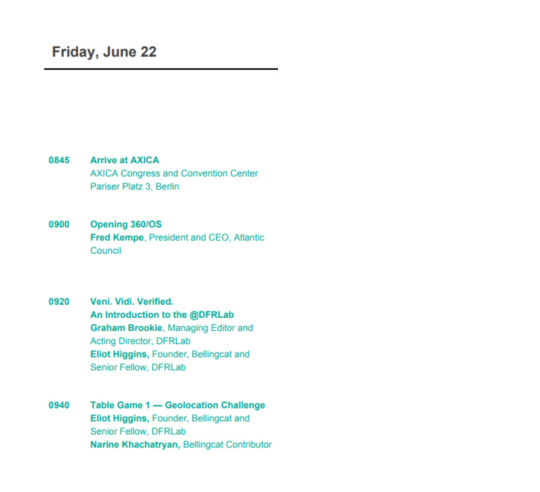
Higgins has a unique way of expressing himself online, given the DFRLab emphasis on striking out against divisiveness:
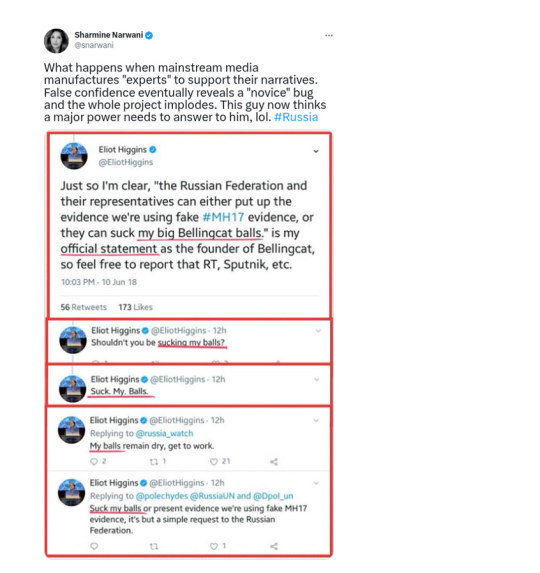
Would this pass RightsCon’s code of conduct? If not, he appears to be good enough for DFRLab to promote.
On the public side, we see Amnesty International participating to further collapse the distinction between those who are meant to hold power to account, and the powerful themselves. The Iraq war gave us embedded journalists, and the “anti-disinformation” field gives us embedded digital rights activists.

The Department of Homeland Security’s Chris Krebs also joined the closed door session. Krebs was Co-Chair of the Aspen Institute’s Commission on Information Disorder. Other members included Prince Harry, the Virality Project’s Alex Stamos (Stanford Internet Observatory) and Kate Starbird (University of Washington and previous 360/OS participant), Katie Couric, and more. Craig Newmark attended as an observer.
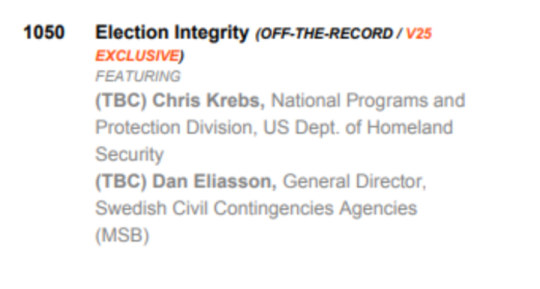
Meanwhile Renee DiResta, former CIA fellow and Stanford Internet Observatory Research Director, presented with the former Prime Minister of Sweden. This was years before she would launch the Virality Project, and take on the bugbear of “true stories of vaccine side effects.”

The President of the Atlantic Council participated in an “off-the-record, “ behind closed doors conversation on “trust” with the CEO of the world’s biggest PR firm, Edelman.
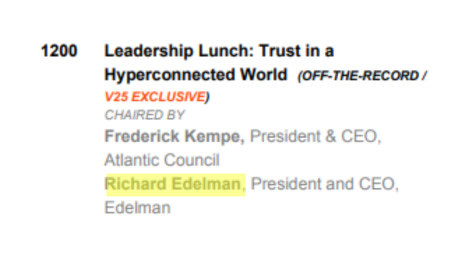
“Public relations” and “trust” may well be opposites, and trust is being destroyed not by the disinformation street crime that these groups claim to target, but by the disinformation corporate crime protected by, or in some cases created by these same people. Disinformation is real, but its biggest purveyors are governments and powerful corporate interests.
DFRLab and RightsCon show just how far the capture of civil society by elite interests has come. Again, I made a mistake helping to co-organize RightsCon in 2015. The jumping in bed with the government and Big Tech was arguably there in 2015, though to a much lesser degree. It now partners with militarists in the form of the Atlantic Council and is an enabler of the “disinformation” grift that is so deeply impacting freedom of speech and expression.
The air-gaps that should separate civil society, media, military, billionaires, intelligence and government have collapsed, and many of these actors have formed a new alliance to advance their shared interests. If weapons manufacturers funding human rights is considered legitimate then where is the red line? Effectively, there is none.
This collapse however has also been pushed by funders, who have been proactive in asking NGOs to collaborate more with Big Tech and government - something I successfully resisted for my almost 18 years at EngageMedia, critically RightsCon was the only time I let my guard down.
The RightsCon sponsor matrix wouldn’t be out of place at NASCAR:
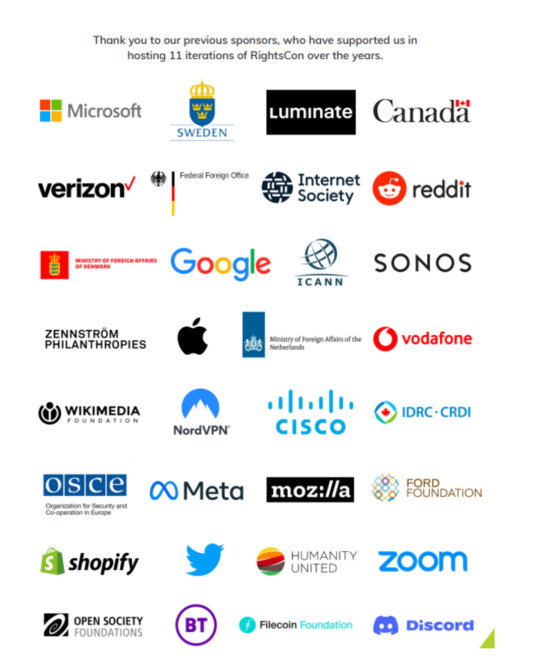
This is the equivalent of hosting a Climate Change conference sponsored by Shell, BP, Chevron, and ExxonMobil. How do you keep power accountable when Big Tech pays your wage? The “let’s all work together” approach has failed. The weakest partner, civil society, got captured and we lost. Many more lost their way and have acquiesced to and often enabled much of the new censorship regime.
A renewed and much more independent digital rights movement, with a strong commitment to freedom of expression, is well overdue.
Note: A previous version of this article mistook Blackstone for Blackwater. This has been corrected.
#rightscon#360/OS#twitter#twitter files#censorship#digital censorship#internet censorship#censorship industrial complex#atlantic council#DFRLAB#covid vaccines#virality project#NATO#propaganda#global engagement center#bellingcat#civic listening corps#world economic forum#stanford internet observatory#big tech#hunter biden#aspen institute#amnesty international#Youtube
2 notes
·
View notes
Photo

#utopistic nostalgias#kyberia#dark academia#old web#gifcities#80s#90s#internet#early internet#internetcore#old internet#80s-90s internet#BBS forums#IBs#imageboards#nostalgia#faux nostalgia#y2k#anti capitalist#global citizen#global village coffeehouse#inspirational#geocities#y2k grunge
173 notes
·
View notes
Text
Welcome to Something Eternal: A Website Forum in 2023 wtf lmao

It's 2023, and a single belligerent rich guy destroyed one of the primary focal points of uh...global communication. Tumblr is, shockingly, kinda thriving despite the abuse it gets from its owners, but that I will call the iconic refusal of Tumblr users to let Tumblr get in the way of their using Tumblr. Reddit killed its API, removing the functionality of mobile apps that made it remotely readable (rip rif.) Discord, our current primary hangout, has made countless strange choices lately that indicate it has reached the summit of its usability and functionality, and can only decline from here as changes get made to prepare for shareholders. (NOTE: WROTE THIS POST BEFORE THEIR MOBILE "REDESIGN" LMAO)
The enshittification is intense, and it's coming from every direction. Social media platforms that felt like permanent institutions are instead slowly going to let fall fallow incredible amounts of history, works of art, thought, and fandoms. It kinda sucks!
A couple years ago, I posted about a new plan with a new domain, to focus on the archiving of media content, as I saw that to be the fatal weakness of the current ways the internet and fandoms work. Much has happened since to convince me to alter the direction of those efforts, though not abandon them entirely.
Long story short? We are launching a fucking website forum. In 2023.
If you remember In the Rose Garden, much about Something Eternal will be familiar. But this has been a year in the making, and in many ways it's far more ambitious than IRG was. We have put money on this. The forum is running on the same software major IT and technology businesses use, because I don't want the software to age out of usability within five years. It has an attached gallery system for me to post content to, including the Chiho Saito art collection. It has a profile post system that everyone already on the forum has decided is kinda like mini Twitter? But it is, fundamentally, a website forum, owned and run and moderated by us. We are not web devs. But we have run a website on pure spite and headbutting code for over twenty years, and we have over a decade of experience maintaining social spaces online, both on the OG forum, and on our Discord. Better skilled people with far more time than we have can and will build incredible alternatives to what is collapsing around us. But they're not in the room right now. We are. And you know what? Maybe it's time to return to a clunkier, slower moving, more conversation focused platform.
You're not joining a social media platform with the full polish of dozens of devs and automated moderation. Things might break, and I might need time to fix them. The emojis and such are still a work in progress. Because e-mails no longer route in reasonable normal ways, the sign-up process instead happens within the software, and has to be approved by mods. Design and structure elements may change. Etc. The point being, that the forum isn't finished, but it is at a place where I feel like I can present it to people, and it's people I need to help direct what functions and things will be in this space. You all will shape its norms, its traditions, its options...choices I could try to make now, but really...they're for us to create as a group! But the important stuff? That's there. Now let's drive this baby off the damn lot already!
Come! Join us!!
PS. As always, TERFs and Nazis need not apply.
#revolutionary girl utena#shoujo kakumei utena#rgu#sku#empty movement#utena meta#fandom stuff#fandoms#expect a somewhat spicy atmosphere#empty movement has always had deep something awful roots#and i expect the migration back to a forum will bring with it some of that more spicy attitude#also lol henry kissinger is dead god that rules
1K notes
·
View notes
Text
It's done! The outline for—

—is below the cut. The goal of this project is to explore the following phenomena with as much context and nuance as I can manage, tracing our history over the past 15 years:
What about us, and what about Dan and Phil, drew in and continues to draw in a very specific audience. If they are a ranch metaphor, we are a pizza metaphor 🥗🍕🫶🏻
Why we were Like That™, by which I mean so parasocially invested in them that we became, at times, the most annoying people on the internet. Much of that reputation is undeserved, and the videos on the phandom to date have been strongly negative. So, uh, I guess I'm going to put my face on camera and (mostly) defend us.
Reblog, share in your Discord servers, reply, or send me messages/anon asks with feedback or resources if you have any! Especially if your experience being in this fandom community has been dramatically different from mine. There are TIT spoilers near the end of the outline, but I'm not tagging because certain individuals seem to be lurking over there. Thank you!
Chapters:

Full outline:
introduction
cold open
felt personally attacked by jonathan haidt's last press tour
showed up to the phrenaissance 11 months late
had an unexpectedly strong response to their new content, needed to find out why
what the hell are we doing here?
- phenomenology (academics are professionally insufferable) - research question 1: what drew the audience in? - research question 2: why were we Like That™?
what we're NOT doing here
- a strict content analysis or "wow we sucked" video - providing sources for things best left uncirculated, thank you
reflexivity (personal biases)
- american zillennial in public health - in the youtube audience by spring 2010 - lurking in the phandom on tumblr 2013-2015, back* since 2019 - fan behavior i did and did not engage in
(----): truly necessary background information, i swear
(pop) cultural trends, tech, and their intersection
- nerd/geek identity and the first online weirdos - broadcast tv & the music industry vs the internet - defining "emo" - blogging & vlogging - early internet comedy
broader social/economic trends
- so the U.S. economy collapsed in 2007 - a decade that sucked except for rom-coms and square enix games - the flip/slide phone + digital camera + mp3 player loadout
(05-8): early youtube and early phil
youtube: a great video uploader without a clear purpose
the content on the website
- crossposts, corporations, and creative/social outlets - omg guys it's amazing phil - contemporary youtube-to-legacy success: justin bieber
the audience of "early adopters"
contemporary social media sites and forums
(2009): origin story
a wild dan appears… in the comments
the global constant that is teenagers being messy online
daring my old school district to sue me
- "one town's war on gay teens" (literal rolling stone headline!) - epidemiology 101: rates of… ugh… "unaliving" oneself - ways kids cope when it seems no adults will help them
the earliest days of dan & phil
- hello internet + pinof - a chronically overexamined timeline - file deleted ---* so how big WAS the audience at the time? ---* acceptable funny/edgy language was just different
contemporary youtube-to-legacy success: lucas cruikshank
omg it's meeeeeee
- how amy & friends were using youtube - ways i was just destined to end up here - being in social environments with peers 3-6 years older
(2010): is it "twenty-ten" or "two thousand ten?"
youtube is a platform about to explode in popularity
- the algorithm before it was The Algorithm™, lost site features - let's take a trip through the wayback machine :3c - actual dan & phil content in 2010 - the green brothers found vidcon - contemporary youtube-to-legacy success: darren criss
social media: also about to explode in popularity
- facebook was cool at the time, believe it or not - law of equivalent exchange: 2010 amy cringe compilation - the birth of instagram and pinterest - youtube slash livejournal (the first phanfics… sort of) - shockfic and its place in the overton window
the beginning of "the great rewiring" as haidt calls it
- ways social media is about to dramatically change - third spaces become online spaces - confounding variable: changing expectations of teens
(2011): the end of an era, the start of an age
a very long tangent on fandom and pop culture
cultural exchange
counterculture and teenagers as concepts
the first british invasion: the 1960s
- beatlemania and its descendents - moral panic about the virtue of tween/teen girls - tv/film/fashion trends being imported from the uk - in parallel, star trek births the modern fandom
the second british invasion: the 1980s
- synth/new pop that came out of the punk movement (hi, emo?) - confined mainly to music and fashion - cool britannia
it's harry freakin' potter
- absolute titan of pop culture influence - the rise of online fandom: examining the horrors ---* what is "wank" ---* flaming, sockpuppeting, and general cyberbullying ---* censorship: ffnet purges, boldthrough, & strikethrough ---* other fandom shenanigans of the time (yaoi paddles, anyone?)
harry potter's over. now what?
- for those who needed coming-of-age hero's journeys ---* twilight and YA dystopia waiting in the wings ---* some pretty iconic tv shows start or hit their stride ---* the mcu's phase one ---* takeaway: the rise of "geek culture" generally - for those who just wanted to go to hogwarts ---* doctor who & the wider world of bbc programming ---* british vloggers, you say? where? on youtube? brb--
end tangent, back to your regularly scheduled programming
dan & phil in the first half of 2011
- a continuation of 2010… for now - the videos - british pancakes as a case study of bad fan behavior
streaming and social media
- the birth of snapchat, twitch, and younow - netflix starts developing original programming - multi-channel networks (mcns) - digitour
dan & phil in the second half of 2011
- and they were roommates (omg they were roommates) - fantastic foursome - youtube glitches out - the super amazing project - the first proper baking video + wait, is that the bbc?
~ baking interlude 1: christmas cookies ~
the family sugar cookie (sorry, delia)
amy's 2011
(2012): why is anyone nostalgic for this
the transition from desktop to mobile
- massive growth in smartphone ownership 2011-2015 - things one might do on mobile one might not do on desktop - non-online ways smartphones changed being a youth™
what is tumblr and why is my child using it
- how the site is meant to work - fandom, memes, aesthetics, and SOME public figures - want to be anxious and depressed in peace? come to tumblr - this site seems a little……… gay ---* tumblr's very queer, very neurodiverse userbase ---* legacy media representation in 2012: bad! ---* actual academic research on tumblr users (yes, it exists) - the tumblr experience for non-native english speakers
amy becomes a vibrating mass of panic and paranoia
- in context of the above - additional rant about the american public school system
the growing dan & phil audience
- investigating the origin of the term "phannie" - more collaborations = more viewers - more video uploads = more /invested/ viewers - younow and interacting with fans - watch time replaces clicks in the algorithm
online etiquette, or lack thereof
- mid-transition from the 2000s to the 2010s - "professional internet celebrity" is still basically brand-new - lack of boundaries - various ways to be an asshole online - unsupervised kids simply do not engage in best practices
the end of 2012
- dan and phil move to london - wikipedia vandalism - tiptoeing around a top contender for the phandom's greatest sin - super amazing project DONE, now it's BBC RADIO TIME
(2013): arguably the most important year
- wait. what's that six-second video platform over there--
[amy's curated vine compilation]
- a new wave of internet comedians (read: future youtubers) - the zillennial lexicon - other platforms start emphasizing short-form video content - magcon
emo is BACK - well, sort of
- fob hiatus ends, mcr breaks up. my god. you had to be there - more open ties to nerd/geek culture than in the 2000s - these things once again intersect at dan and phil
dan and phil in the first half of 2013
- siri, what's a "sex symbol?" why are you booing me i'm right-- - d&p are everywhere - radio shows, interviewing, hosting - youtube uploads on their individual channels
rapidly changing cultural attitudes towards queerness
- gay marriage will be legal in places other than canada soon - a lot of assimilationist rhetoric though tbh - parallels to the pop feminism of the decade
hey kids, let's talk about compulsory heterosexuality!!
- what is it and why do people do it - academic, tumblr-level, and anecdotal research - the dannies, the phillies, and the phannies
amy
- the closet™ - mental health stigma - 2013 dnp posts from my main blog
dan and phil in the second half of 2013
- subscriber milestones, vidcon - joint content before the gaming channel - phandom starts having a major presence outside tumblr
(2014): achievement unlocked!
it's time to talk about rpf
- definitions (a chance to be annoyingly pedantic) - academic perspectives and fan discourse on the ethics - when the subjects clearly aren't fine with it - so… we can acknowledge "shipping phan" was different, right? ---* sometimes the subjects are fine* with it, actually ---* how dan and phil started to handle the shipping ---* obvious differences between phan and other rpf ships ---* sharing my favorite passages as a first-time phanfic reader
dan and phil in 2014
- wikipedia vandalism 2: electric boogaloo - bbc request show → internet takeover - the 7 second challenge - youtube content, subscriber milestones, rewind - cons and award shows
tumblr reaches the peak of its influence
- yahoo's attempts to monetize the userbase - buzzfeed and aggregators steal our jokes and bait our clicks - legacy media dangles carrots and uses us for free marketing - the legend of korra breaks TV precedent, almost out of nowhere - the tumblr user experience ---* on mobile, without xkit ---* on desktop, with xkit ---* 2014 dnp posts from my main blog
gamergate and its long shadow
- trolling, renewed and revamped - algorithms push increasingly extreme content - the broad conservative backlash conglomerate - increased normalization of conspiracism in general
my greatest sin [not clickbait] [very funny]
- so, circling back to comphet… - the actual story
anyway, let's talk about danandphilgames
- a star is born: dil howlter - different types of gaming content on youtube at the time - why did 17yo amy not subscribe? well…
~ baking interlude 2: chocolate cupcakes ~
make your own frosting. it freezes well
roasting myself further
(2015): it's not queerbaiting when it's real people
facebook "pivots to video"
- mark zuckerberg lied. water is wet - causes other platforms to REALLY double down on video - the birth of musical.ly - corporate-branded creators (read: future youtubers)
queerbaiting enters mainstream public consciousness
- academic origins - early fannish and acafan writing - johnlock, destiel, and sterek - statistics 101: type i error, type ii error, and queerbait
dan, phil, and the phandom
- bbc, cons, & the brits - danandphilcrafts - phan conspiracies ---* japhan ---* body language experts ---* timeline truthers ---* floor plan investigators ---* no but seriously imagine it - regular youtube uploads ---* solo content ---* joint content ---* subscriber milestones, rewind - tatinof uk and tabinof ---* on "selling out" ---* revisiting the statistics 101 lesson: now with real people! ---* never meet your heroes (unless they're dan and phil)
amy's (temporary) exit from the phandom
- it's legal adulthood with a steel chair!! - growing discomfort with some fans' behavior - 2015 dnp posts from my main blog - the closer: final fantasy vii
(2016): season finale
vine's imminent demise
- content platforms behaving badly - content creators behaving badly
youtube after "the great rewiring" (as haidt calls it)
- version 1.0 of the modern youtube algorithm ---* deep neural networks for dummies ---* what's holding creators accountable, or not - advertising and sponsorships ---* basically every child and youth™ is watching now ---* the battle for our attention ---* regulators start to crack down on undisclosed ads - the rise of drama/tea content (and later, channels) ---* youtubers are now seen as regular celebrities ---* dan and phil as the butt of other youtubers' jokes ---* baiting the phandom for engagement
tatinof us and aus
- a proven new model for live show tours - show & documentary released to youtube red (now premium) - [sigh] the tour bus
sea change in online fandom
- the newer, sometimes queerer media in korra's wake ---* better and more representation in live-action tv shows ---* voltron (i'm sorry!!!) ---* the mystic messenger craze ---* alice oseman & heartstopper - the new dynamics of #discourse ---* proship is to anti as phannie is to phanti ---* the bad behaviors of the 00s get a new coat of paint ---* new, though: fans harassing creators ---* a personal note on ace discourse
dan and phil presence off-tour
- the internet takeover ends - regular content, subscriber milestones
so. uh. current events.
- brexit - sorry the united states is a font of chaos - ripple effects
closing out the year
- amy finally gets an anxiety diagnosis and treatment! hurray! - dapgo, rewind - bbc radio awards & the boncas - gamingmas
(2017): time for a rebrand
tangent - sit down!!! buckle up!!! today's lecture is on PSIs & PSRs!!!
"parasocial" as defined by the current zeitgeist
- summing up youtubers' and laypeople's opinions (not dan's) - an unfairly negative stance overall, imo
older academic literature
- the 1956 paper (yes, 1956) - with traditional celebrities - with fictional characters
current academic literature
- with youtubers and other content creators - positive effects on the audience - negative effects on the audience - broader societal implications
fandom spaces as a parasocial experience
- parasocial and truly social interactions with each other - phandom as a supportive, welcoming space for oddballs - what research i can find about neurospicy folks, + anecdotes - me and everyone else on planet earth move to discord
inherent transactionality
- the nature of celebrity - positive effects on creators - negative effects on creators
reexamining early phandom through a parasocial lens
- the good, the bad, and the ugly - the role audience demographics played in all of this - entering, exiting, and remaining in the phandom
end tangent, back to your regularly scheduled programming
vine is well and truly dead
- some had prepared to become primarily youtubers (smart) - some move to musical.ly, insta, facebook, or snap (less so)
the sun sets on danisnotonfire
- i am very normal about dan's hobbit hair, i swear. - the last dnp content before the rebrand - new apartment, new floor plan investigations
adpocalypse now
- youtube has become the village elder of platforms ---* increased scrutiny, increased responsibility ---* some youtubers had been getting away with !#$!#@% - the scandals ---* pewdiepie + logan paul ---* elsagate and being "family- friendly" (read: ad-friendly) - censorship and monetization ---* adsense revenue goes down as advertisers pull out ---* the glory days of posting whatever and making bank are over
amazingphil and ~daniel howell~
- youtube & younow content - that week in march - vacations and conventions - conjoined baking and the concept of a "soft launch" - daniel & depression → dan as a mental health advocate - truth bombs, ii announcement, rewind
(2018): the phandom vs the hiatus they told us not to worry about
interactive introverts
- "giving the people what they want" - in hindsight… - let's talk about dnp fans from the global south
youtuber burnout
- it wasn't just dan: (more examples than header fits) - the old model was simply not sustainable - newer contributing factors - research on burnout, plus personal anecdotal experience
other dan and phil content
- younow/rize lives - dan's last videos before… you know… - phil's solo content in 2018 (quiff!!) - pinof → wdapteo - the gaming channel
other stuff happening online and in the world
- youtube raises the barriers to monetization - many "pivot to video" creators are now independent - the modern youtuber's multiple streams of income - continuations of societal trends in 2016 - musical.ly becomes tiktok - notable: she-ra and the princesses of power
the hiatus™: part myth, part reality
- how long dan was actually offline - major confounder: tumblr implodes almost overnight - major confounder: perception of content density from '13-'16 - major confounder: rapidly maturing audience - major confounder: our temporal awareness is about to go way ↓↓
~ baking interlude 3: scotcheroos ~
minnesotans and their obsession with "bars"
amy has one last existential crisis (you know, to date)
(2019): demolishing the closet with a nail bat
phil videos in the first 5 months of this very important year
basically i'm gay
- my thoughts - its legacy in the canon of "coming out" stories - multiple things can be true at once
coming out to you
- my thoughts - its legacy in the canon of "coming out" stories - why phil waited (actual explanations, speculation)
amy's 2019
- return to the audience, not really to the phandom (rip tumblr) - strange coincidence that i also had a major life transition
dan and phil: still here, freshly queer
- twitter becomes the main nexus of phandom, by default - regular phil uploads + brief return to younow - vidcon
(2020): go home and stay there
so it's a goddamn global public health crisis
- infectious disease perspective - effects on overall well-being of adults - effects on kids and teenagers (sorry to all of you) - political and economic impacts
hitherto unforeseen levels of online content consumption
- tiktok replaces basically all short-form video content - yet another wave of new (otherwise unemployed) youtubers - you're watching a video essay. these got really popular now. - being young and isolated: thoughts from younger phannies
the Content™ bc that's the one word we use for this now
- phil's videos - when dan is around - that attitude magazine interview - pour one out for the phil solo project(s) the panini wrecked
further political disaster… avoided?
- checking in on the state of social issues previously discussed - unfortunately,
(2021): welcome to the 2020s, we have lingering trauma
THE PHOUSE?!?!?
- social media posts - the stereo shows
other dan and phil videos
- phil's solo videos - gay and not proud - hometown showdown - other joint videos - phil's #shorts (sounds normal in american english)
panini updates
- vaccines soon, uwu??? + entrenched misinformation - pros and cons of remote work - pros and cons of remote school - pros and cons of remote socializing
you will get through this night
- younger me really could have used this book too, dan - thoughts as a professional in a related field - reflecting on some of my more unique circumstances
daring my old school district to sue me (again!!)
- updates: racism and transphobia - updates: right-wing freaks take over the school board again - residents vote against improving mental health resources
(2022): dan returns (still not on fire)
hey so politics are um getting worse
- americans lose the right to reproductive freedom ---* the quickest of histories on where these freaks came from ---* this shit kills people. - trans kids become the punching bag of culture war discourse ---* fuck off! (gently) ---* fuck off! (i have a knife) ---* checking in on terf island
we're all doooooooooooooooomed
- dystopia daily my beloved - the style, the substance, the metatextual analysis-- - not everyone loved it, though. why? - the promo - dan on tour + sister daniel
amy's 2022
- i got covid - then i got long covid: brain fog, pots-like symptoms
some more news (i will work on my warmbo impression)
- dan joins tiktok + danisnotinteresting uploads - phil: uploading less, busy doing remote crisis management - twitter is acquired by an idiot jackass - heartstopper on netflix! ---* the show and what it means to people ---* drama (revisiting "real people can't queerbait") ---* why this has anything to do with the phandom
~ baking interlude 4: cinnamon rolls ~
- lovingly, recipe changes and corrections :) - if i have an opinion about anything, it's sweet yeasted breads
(2023): the phrenaissance
phil
- joins tiktok! - youtube uploads through september - what even is phannie tiktok. i've never used this app. help.
dystopia daily b-sides
- dan memes of 2022 - the 2023 dystopia daily episodes
amy: the doctoral candidacy process
- purgatory, privilege, poverty, and free pizza - checking in on what this is like outside the united states
pretending the panini is over
- complaining about post-adpocalypse censorship standards - honest take about "giving up" on covid - who gets the short end of the stick
the youtube algorithm is BAD and UNINTELLIGENT, actually,
- unhinged rant about not hearing about the gaming rephrival - because i was offline from other platforms. like, @amyoffline.
pov: you are a phannie (not me) on october 15th
- what i was doing on october 15th - saying goodbye forever, spooky week, and november - gamingmas - phil uploads through december
(2024): fifteen years of terrible, terrible influence
hey what the fuck is going on
- dan and phil ---* joint and phil videos ---* jokes they never would've made ten years ago ---* a collection of emotional posts about how far they've come ---* people want fun and silly content again. we'll get to why ---* nostalgia, hope, and other warm and fuzzy feelings - the phandom ---* ancient parasocial attachments, reactivated instantly ---* people are way more normal now. let's discuss why ---* tumblr vs twitter vs tiktok phandom
we're all doomed, youtube version
- my thoughts - thoughts on "dan should/shouldn't" do video essays - i can't objectively evaluate anything he makes bc [gunshots]
terrible influence tour
- legally phlonde - the concept: healing one's inner child / taking it back - we gotta talk about phannies in the global south again - no but seriously imagine it? ---*ogres are like onions, they have LAYERS ---* [placeholder for whatever does(n't) happen]
anglosphere current events once again
- the likely us tiktok ban - the tories get fired - [placeholder for whichever hell americans manifest] - witnessing genocide and feeling powerless
ffx full-circle moment to the intro of this video essay
- the night i found out they came back - why i am doing this, now with context - reflections on a nearly 15-year (parasocial) relationship
whatever youtube uploads we get during fall/december
AMY SEES TIT (nov 14)
- the vibes at the phamily reunion - buying merch to apologize for eternal ublock origin use - how much should i document?? (not during the show) - phanspiracies confirmed - atlanta confessions - favorite bits - the alternate universe where i went to tatinof and/or ii
(2025): the horrors persist, but so do we
whatever 2025 content is out while i'm still working on this
our parasocial social club
- let me be philosophytube for a second ---* every interaction has a parasocial element ---* what are we obligated to do as a phandom, actually? ---* as people who parasocially care about these two dorks? ---* what else should we be doing socially to be at our happiest? - "they're my gay uncles" vs "i'm a little in love, even now" ---* riffing about the boundary/overlap between these camps ---* sibling reads me for filth in a single text (sister daniel...) ---* at least we're all in this together
what's going to continue to draw people in
- grown adults drawing our cat whiskers back on - updates on queer/nd kids - updates on anxiety/depression rates - updates on tech and the broader environment of content - world still feels doomed
tangent - the "hard launch" and why people want it
what are people referring to, exactly
- general definition and other examples - when it comes to dan and phil - maybe they hard launched already and we just missed the memo
the ludonarrative of phandom
- if you got here early on - if you got here in the mid-2010s - if you got here after they came out - if you got here post-hiatus - final fantasy comparison: ffvii's chokehold over first-timers
a rom-com for the ages
- the tropes in play - brief tangent on the evolution of the genre - queer romantic comedies - final fantasy comparison: ffviii's plot and squall/rinoa
phriends… or…
- wholesome influence, slice-of-life - projection - final fantasy comparison: ffxv's gameplay loop, the chocobros
humans don't like ambiguity
- from a media perspective (narrative tension) - research from the hard sciences - final fantasy comparison: fanille ---* the first gay final fantasy characters, actually ---* ffxiii's character development process ---* fang and vanille in the text. brb, clawing at the walls ---* so, if anyone is looking for a phyuri au prompt…
tl;dr: reality is not fiction. make peace with not "knowing"
end tangent, back to your regularly scheduled programming
the phuture
- phil's big solo project when??? - dapg is just the joint channel now - youtube has changed since when dan last "regularly" uploaded - nothing lasts forever, and that's okay
~ baking interlude 5: ranch + pizza ~
- ranch propaganda and ranch metaphors - showing off my dough and sauce skills
conclusions
- a lot has happened in 15 years - [placeholders: don't write your conclusions before you do your research]
Proof this project can only be done in consultation with Tumblr: no other platform we're on could accommodate a post of this length and formatting detail lol
#dan and phil#phan#dnp#daniel howell#amazingphil#this took so long to format oh my god please read it and talk to me#except it's 1am in my time zone so i'm going honk mimimimi soon enough#amy writes
180 notes
·
View notes
Note
chase I want to know about your major desperately; cyber anthropology???? that's INTENSELY interesting to me
It's as simple as it sounds!
Anthropology is the study of humans. It's right there in the name, Anthropos Logia (Human Study). My study was primarily around Logs 'n Logos 'n Letters: Cultural study of communication and preservation. I call myself a linguistic anthropologist, because that was the branch I studied.
Cyber anthropology is another branch based around digital communities!
Imagine how much art and resources (that REAL HUMANS spent years and years of their lives on) completely vanish every time an obscure MMO fails and the company quickly makes room on their servers for a new project to recoup losses.
Imagine if Wikipedia axed its forum and hundreds of thousands of in depth conversations surrounding the nature of information itself was lost because nobody was thinking too hard about em.
THINK ABOUT HOW MUCH IT SUCKS THAT THOUSANDS OF MODERN HUBS OF INFORMATION EXCHANGE HAVE BECOME FRUSTRATINGLY OBSCURED BY THE NEED TO JOIN A DISCORD INSTEAD OF HOSTING A WIKIA OR A FORUM.
The state of digital information and cyber culture is a fucking MESS because for most of the internet's life, online experiences have held a stigma of being inherently less valuable than in-person experiences. As a devestating result, there is an enormous crater of disorganized information and defunct, dead links accounting for the most significant communicatory boom in human history.
Cyber anthropology is extremely necessary if the internet is to remain a central tenet of international culture and global communications, and I'd LOVE to read some fuckin useless argument against that.
520 notes
·
View notes
Text
Back in 2005-2006 one of the first friends I made online was a girl in Beirut on a Harry Potter forum and then in 2006 during the Israeli attacks on Lebanon she disappeared and didn't ever come back.
and like. I don't know what happened, maybe she died, maybe she lost internet, maybe she had more important things to think about, maybe she just wasn't interested in Harry Potter any more, idk.
But like as a 13 year old who'd only ever lived in a wee village in England, I had been aware of war, but that was the first time for me that it had occurred to me that I might know the people under attack.
I have thought about that a lot over the years, cause really I think people my age and maybe a wee bit older are the first generation in the imperial core that likely to have a personal connection to people in the global south and people dehumanised by Western media.
but I'm also thinking about her because fuck me the sheer scale of violence in Palestine and now Lebanon this year compared even to 2006. god.
#red said#in 2006 Israel killed about 1500 people in Lebanon over 34 days#around 800 have been recorded killed so far in the last week
30 notes
·
View notes
Text
Earlier today I was making a ceramic necklace pendant and was like "hey, I wanna make something werewolf related I can wear" so I was thinking and started wondering if there was any kind of general "werwolf symbol" out there that I could carve onto said pendant.
I found out that there is! It's an ancient shield emblem originating from Germany and Eastern France called Wolfsangel, which translates to "wolf's hook" and was sometimes associated with lycanthropy, and was later adopted by peasant revolutionaries as a symbol for German liberation in the 15th century. Pretty cool right?
Well not so much actually.
Im really really glad that I kept researching before I started carving because apparently Wolfsangel was actually appropriated by the Nazi's during WW2 and is now globally classified as a hate symbol. Great :|
All of this is to say that I think it's about time we created/found a new symbol for werewolves, one that doesn't have a shitty double meaning lol. Something like the theta-delta or elven star, but for werewolves (or werebeasts in general) specifically. Not sure if one already exists somewhere, I couldn't find one while researching but I wouldn't be surprised if there was one tucked away in some dusty old 2000's internet forum that someone would like to clue me in on. But if not, I think it'd be cool to start trying to figure out a new one, something that anyone who identifies with the "were" label for any reason can use!
If for no other reason, than at least just so I can find something to put on my pendant lmaooo
#tw n@zi mention#tw n@zi#tw wolfsangel#werewolf#lycanthrope#lycanthropy#wolfblood#irl werewolf#irl lycanthrope#irl wolfblood#werebeast#werewolfkin#wolfbloodkin#teen werewolf#teenwerewolf#werekin#werefolk#werebeing#otherkin#otherkind#holothere#physically nonhuman#therian#alterhuman#nonhuman#therianthropy#transspecies#endel#anti transid#anti rq
38 notes
·
View notes
Text
Internet politics have been shaped by a cyberlibertarian framing best exemplified by the writings of Electronic Frontier Foundation cofounder John Perry Barlow, whose Declaration of the Independence of Cyberspace became a key statement of principles for digital activists. His manifesto targeted its ire at governments, telling them, “You have no sovereignty where we gather.” He made no mention of the harmful influence corporations could have on online spaces, which was a reflection of Barlow’s personal politics. He was not only a speechwriter for Dick Cheney in the 1970s, but the Declaration itself was published at the World Economic Forum in Davos, Switzerland in 1996. This cyberlibertarian framing of digital politics and its focus on speech over political economy has proved beneficial for tech companies for many years. As US tech firms went global, digital activists frequently opposed government efforts to regulate or restrict tech platforms as threats to their citizens’ digital rights and freedom of expression, largely ignoring the economic impacts of US economic imperialism in those countries. In the process, US companies were able to dominate international markets and few countries were able to establish the necessary economic protections to develop serious competitors to the American giants. In countries like China, where protections were effectively implemented, digital and human rights groups rarely paid any mind to the economic component of those policies; they were narrowly positioned as censorship measures. The Great Firewall is used to restrict what Chinese internet users can access and post online, but it is also an economic measure. China protected its tech sector in a similar way that Japan and South Korea protected their automotive and electronics industries in decades past, spawning globally competitive, export-oriented companies like Toyota and Samsung. China’s Great Firewall allowed it to do the same, creating serious competition for Silicon Valley that would have never happened without economic protectionism. Digital rights activism served the global ambitions of the tech monopolies forming in Silicon Valley and Greater Seattle by positioning attempts at restricting platforms and making companies abide by local rules and norms appear as overbearing government intrusions on people’s rights. In the cyberlibertarian framing, government — not corporations — are the enemy, and that was reflected in the way many activists long approached tech policy. It certainly doesn’t seem like a coincidence that it also served US commercial and geopolitical ambitions. Where countries previously placed ownership restrictions on its media and telecommunications sectors and invested in public broadcasters, that was all out the window with the internet. Foreign governments were expected to accept the dominance of US firms, or else be accused of breaching their citizens’ rights.
6 September 2024
28 notes
·
View notes
Text
So there's something we really need to talk about, generally as a collective, but especially in nerd/fandom spaces. And that's the collateral damage that comes with hyper-policing of "objectionable" content that will inexorably roll into fascism. Strap in, this is that kind of Tumblr post.
If you look at the of ideology of generations throughout the twentieth century, there's a pattern: each new gen is going to swing opposite of their parents. 50's patriotism, 60's and 70's hippies, 80's Reagan era America, 90's 3rd wave feminism, 00's ultra patriotism, you get the idea. So to some extent, it's not that surprising that Gen Z is starting to lean conservative. But as someone who's been in fandom spaces for well over two decades now, believe me when I tell you that the pendulum has swung so far right that--given the current political climate in America (and to some extent globally)--this is a microcosm of a much bigger issue.
Back in the 2010's, the internet was starting to grow its roots. The truly experimental days of random websites, chat sites, strange niche forums, etc, had started to congeal into a handful of massive platforms. Facebook was taking off. YouTube was past its baby stage and into its adolescence. There was a fragile stability that allowed for growth and expression in art. Particularly in fandom culture. We as a generation were growing with this new, amazing technology. And humans, when curious, like to stretch their limits. Fandom and geek spaces stretched wide, from insanely ambitious fancomics to the dredges of FF.net. And a not insignificant part of this new community was diving into the dark and the taboo.
Artists and writers wanted to explore all elements of humanity. Because, plainly, we weren't allowed to experiment with mass media. And so we made our own. Queer kids explored identity and sexuality, trauma survivors craved catharsis. Growing brains tapped into the dark and depraved if only to see where it led them. It was a playground. It wasn't always safe, and it wasn't always productive. Sometimes it was just porn for porn's sake. But that in and of itself was not a moral judgment. Sure, you'd absolutely get side-eyes if you proudly boasted that your favorite anime OVA was Boku no Pico, but most people would laugh it off at a convention and then head out to their next panel.
What I'm saying is, ten, fifteen years ago, there was a sense of understanding that the dark, sexual things in fandom spaces were just another facet of the culture. This is not to say that truly disturbing media and criticism of it did not exist. Hell, when Twilight debuted, I was one of the first of my high school to criticize the abusive relationships for what they were. The ability to criticize, to analyze and reflect on what makes something "good" or "bad" is a healthy mechanism to have. And those who did not want to engage with material that they found disturbing or uncomfortable simply didn't have to engage with it. It's why AO3 has tags. It's why Tumblr has a block or mute tag function.
But what we're seeing now is so far beyond the healthy critiquing of distasteful art. More and more now I've been seeing well meaning, liberal presenting voices equate real harm to distasteful material found in books, movies, TV shows, you name it. That is not to say that things like racial stereotypes or romanticised abuse does not have real world implications. But it is one thing to point out that "hey, 50 Shades of Gray is an unrealistic depiction of a BDSM lifestyle and if you try these things you'll likely get hurt" and "seeing characters on screen have sex violates my consent as a viewer." (that is a real argument I have seen online)
There is a hyper moral slant to this kind of thinking. The same line of thought that immediately equates "a character does a bad thing" to "the author must condone this bad thing." I have always said that we do not have a lack of media literacy, but an uptick in a reaction based economy. That reacting to a controversial thing without first digesting the thing you're reacting to gets good views and feeds the algo, so the conversation then becomes a shouting match between people that haven't even seen the damn thing. This is how you get people coming away with "Steven Universe is a show that supports genocide" with their full chest.
The push to have blatant censorship in fandom is upsetting for a good number of reasons. It's discouraging to younger creatives who want to play in those spaces for their own reasons, and it feeds into a frenzy of paranoia. Because at a certain point, it no longer becomes about the art, but whether or not you, with your Right Opinion, is the first on the dogpile.
So what does this have to do with fascism? A whole hell of a lot.
One of the first targets in a fascist regime is art. It's expression, it's creativity. Why? Because creativity is often the best vehicle (sometimes the only vehicle) to criticize the people in power. Why do you think gigantic corporations are trying to push AI art on us so bad? Because art makes us human, and humans like to point out when Shit Is Going Bad. So if you take the human out of the art, you can trick people who aren't looking too closely into being compliant.
The recent hyper-policing of fandom spaces is a tool of fascism. This is not hyperbole, nor hypothetical. It is the reality of how fascism lives and breathes. If you can convince a population to weed out the "bad" art on their own volition, weeding out the rest on your own is a piece of cake.
Before anyone puts words in my mouth, I am not talking about child abuse content, content surrounding victims of trafficking, revenge porn, or anything that brings actual physical or psychological harm to another person. With that being said, policing sexual content in fandom leads to policing any kind of intimate content at all. And as so often is the case, queer content is often lumped in with the former, despite the fact that identity and gender has nothing to do with sexuality. And that sexuality itself is a part of the human experience, and its rejection of its imitation in art is a rejection of that humanity. It's the dominos that lead into history being flat out erased. Once all the nasty sexual content is dead and gone, they'll push further. What conflict, what subject matters, are obscene? Coming of age stories? Slice of life stories? Epic fantasies, scifi, non fiction? Perhaps all of them. You can't be too careful. The heart and soul of stories, art, poetry, expression, all of it is subject to the whims of an oligarchy that frankly doesn't care if you have food in your fridge. If you speak up, speak out, put your foot down, you too are subject to those same whims. And it is so much easier to make sure you shut up forever than to be diplomatic.
We are facing a dictatorship here in America. We are going to be looked in the eye and told that we do not matter. That the best thing for us to do is to stay in line and be thankful for the stale bread on our plate. The last thing you should be doing right now is trying to speed up the process.
15 notes
·
View notes
Text
1. The Letter That Started It All
On a sunny day in late May, I received a letter from someone whom I'd corresponded with on a story years earlier. The letter was confusing and fairly alarming. I will attach it here:
Something is going on here. I'm missing time. I can't seem to remember what my job is, but I know I've been doing it. And I get all warm inside when I think about work. A little voice in my head is saying I'm doing a good job. But at WHAT? I wake up at night from dreams that… I can't remember. Or won't remember. Or don't want to remember. My clothes don't fit anymore. When I ask the people here who used to be my friends they all tell me not to worry. That it just means I'm settling in to the job. I don't think I want to settle in. But I also can't seem to leave. Please help me. Emily Voss
Emily had recently taken a job at Sunda Systems, a global conglomerate with it's research headquarters in a North Carolina town known as Eden Springs. Her position was that of an Administrative Assistant in the Optical Research Division.

According to a phone call I'd had with her just after her hiring, she took this position in early April after having been recruited by another employee. I believe his last name was Varas, though I am admittedly basing that on an unremarkable memory from months ago.
That phone call was the last I spoke with Emily until this letter arrived. That was not uncommon. We were not very close friends, just acquaintances and occasional collaborators. She wasn't one to kid around very much, but I couldn't shake the idea that this was all just a practical joke.
Something in the back of my head was convinced that nothing bad could be happening at Sunda. After all their motto is "Connected in Harmony." I have a Sunda modem and router combo here in my apartment, though I'd never given it a second thought until I began this project.
It is for this reason, and a deep regret, that I ignored her letter for days. But it kept nagging at me and so I decided to do some cursory digging. After the glowing reviews from top brass in various governments and corporations, I found a small post on a forum devoted to conspiracy theories. I will post it's contents here:
Does anyone think it's strange that S*nda S*st*ms has a positions listed on their job boards seeking psychologists, psychiatrists, and neurologists? Any company that big has got to be up to no good.
The post is still visible in it's archived form, however the user, who went by w3bofli3s_222 made no posts after that one, and their account has been deactivated. No contact information was available for them.

For their part, that did appear to be true. The job listing website "Karear" contained the above listing for a Behavioral Psychologist who would be making six figures.
What would an internet infrastructure company need with a behavioral psychologist? And what work would they be doing that would allow them a bonus?
Out of curiosity, I inquired. Two hours later, I received a phone call from an unlisted North Carolina area code. The following is a transcript of the relevant parts of that call:
R: Hello there! My name is Reggie. I'm so happy you're interested in the psych position. How can I be of assistance. I: Hello Reggie. It's nice to hear from you. My name is Helen, which I'm sure you know from the form I filled out. I've been job hunting and I was wondering what exactly the job entails. R: Of course I'd be glad to explain everything. Have you heard of our company before? Perhaps you've used one of our devices? I: Yes, my internet provider uses your routers. R: Wonderful. Then you know that our mission is to make the world Connected in Harmony! To that end, we employ several psychological experts to act in concert with human resources. We have some of them monitoring employee morale and productivity. Some act as advisors to help us maintain healthy work cultures. And some act as councilors that are available to our staff. I: That is quite impressive... R: The position we are currently seeking to fill would be one of the advisory roles. We want our employees to be as relaxed and comfortable as possible while on the job. It's very important to us that our employees feel at home here; that they can breath easy and lose all their stress. Would you agree that's important. I: Yes... I would... R: That's good. It's important that prospective employees share our values, the first of course being Connected in Harmony. When people are together, they are understood. When people are understood, they fear less. And when people fear less, they relax more. I: ... R: Helen are you there? I: What? Oh sorry yes! I was just looking at my notes. Now the website mentioned a bonus structure? R: Yes, that's something that we could talk about that more in-depth during a formal interview. We like to reward our advisors when things are running smoothly. If employees are happy, then the psych team is doing it's job well. I: Okay well I think I have what I need for know. Thank you for taking the time to talk. R: Of course. I look forward to seeing your application soon.
It was an odd call. I found myself almost nodding off as he spoke, though I was sure I'd gotten a full night's sleep. I came away from it believing that things couldn't be as bad as Emily made them seem. Sunda was a good company determined to do good in the world.
Right?
But as I logged into my computer, I noticed the little light was on that signals the webcam was active. I checked through all my open windows and nothing should have been accessing the camera. And as I stared at it, confused, it blinked off.
I guess it could have been a glitch, but just in case, I got a small piece of electrical tape and covered the webcam. I left the light exposed, though. Better to know than to blind myself, too.
It was such a little thing, but it was enough. Emily's letter. The weird job listing. The call that made me feel so strange. And now the mysterious webcam activation. It was too many oddities to write off.
It was time to start investigating in earnest.
39 notes
·
View notes
Text
By Nachum Kaplan
Hamas correctly identified that antisemitism was only dormant in the West, and that they just needed to wake the sleeping monster. They knew this because there were clear tells, such as the international media’s fixation on Israel, the over-reporting of the country, and that the Pavlovian way the conflict becomes newsworthy only when Israel responds to an attack.Hamas stuck to what has worked throughout history. The blood libel trope was modernized into accusations of genocide and deliberate starvation, while the trope of Jews being responsible for their persecution was updated with the notion that Israel had turned Gaza into an open-air prison.They leveraged their numerical advantage.With more than a billion Muslims globally, Hamas knew it had a huge virtual army it could activate on social media to reach a global audience.Hamas flooded social media with lies to exploit the Repetition Bias, a heuristic (mental shortcut) in which repeated information feels more true than new or unrepeated information. Social media repeated these lies exponentially, aided by extensive use of AI-generated “photographs.”The Palestinians also exploited another numerical advantage, the number of Muslim states, which is 48. This has given them weight in forums such as the United Nations and its various committees and bodies, creating a suited army of bureaucrats with credible titles to tell lies to the international press.Almost comically, Iran has just assumed the presidency of the UN Conference on Disarmament. That is the same Islamic Republic that funds, arms, and trains Hamas in Gaza, Hezbollah in Lebanon, the Houthis in Yemen — and ships arms to Russia to use in its invasion of Ukraine.They controlled the information flow.Hamas and the Palestinian Authority have used traditional authoritarian tactics to control the information flow from areas they govern. Reporters cannot report freely or unfavorably from Palestinian-controlled territories if they want to retain access. Threats of violence keep the few unsympathetic local reporters in check.Exploiting the inability of most media to report from Gaza directly, Hamas has used local Gazan “journalists” to feed lies, distorting images, and fabricated data to the credulous international media. Time and again, the foreign press has swallowed them, including claimed civilian death toll numbers that are demonstrably untrue (and presume every person killed was a civilian).Hamas has only needed the media to report its numbers, knowing that if repeated enough, they be treated as true and that no one will pay attention to the fine print stating they are unverified. Hamas at one point even had the media complaining that Israel was simultaneously not allowing reporters access to Gaza and targeting journalists there.They mastered the 24-hour news cycle.The internet has blurred the traditional lines between print and television news, turning all news media into digital services beholden to the 24-hour news cycle.Hamas has understood that as long as it keeps manufacturing outrages, the news cycle will move on quickly, and they will never be held to account. The Qatar-funded Al Jazeera, which has the veneer of a real news organization, has played a key role in this.They have exploited a ‘post-truth’ world.Hamas recognized that the post-Modernist rot has resonated in much of the West, including across its media and universities. The belief that people cannot only have their own opinions, but their own facts, sounds laughable, but it has become worryingly normal.Political tribes express opinions mainly as identity signals, and tribal loyalty is more important to these people than truth, or even reality. Hamas has understood that this liberates it from any need to have a fact-based narrative.They use simple slogans.“
59 notes
·
View notes
Text
Matt Shuham at HuffPost:
When Jesselyn Cook wrote about the children of QAnon believers as a HuffPost reporter in 2021, she didn’t expect the reaction she would receive ― hundreds upon hundreds of emails from readers, all of who had lived some version of the same story, and all of who seemed to have some version of the same question for Cook: What happened to the person I love? In her new book, “The Quiet Damage: QAnon and the Destruction of the American Family,” released Tuesday, Cook sought to answer that question, profiling five real-life people who fell into the conspiracy theory rabbit hole, and documenting the devastating impacts their departures from reality had on their loved ones. These days, “QAnon” represents an umbrella of countless conspiracy theory beliefs. But it started with bogus claims on an internet forum by an anonymous account ― “Q” ― who claimed during the Trump administration to have high-level access throughout the American government, and who painted an unimaginably wide picture of corruption, sex abuse and revenge for their followers.
According to Q, financial elites and the “deep state” are in fact members of a vast child abuse ring, and they dictate global politics from the shadows. Donald Trump, in this universe, is secretly fighting against them with the help of QAnon believers, or devoted “digital soldiers,” and working toward the eventual “Storm” when QAnon’s villains will be either executed or imprisoned en masse. Over the years, Q’s predictions have been widely debunked. And the “Q” behind QAnon has urged followers to stop using references to “Q” or “QAnon” at all, and instead to try and influence politics from inside the mainstream. These days, QAnon believers have largely fused with existing far-right movements, such as the anti-vaccine movement, or Republicans’ moral panic over transgender rights. Cook’s five subjects ― she uses the pseudonyms Emily, Matt, Doris, Alice and Kendra for them ― come from a wide variety of backgrounds. They’re Black, white, rich, poor, and range politically from hardcore conservatives to a former Bernie Sanders supporter who became disillusioned with politics after his 2020 presidential primary loss.
Jesselyn Cook wrote in her new book The Quiet Damage: QAnon and The Destruction Of The American Family that came out Tuesday detailing how QAnon divided families and friend groups.
These stories serve as a major fulcrum of Reddit’s r/QAnonCasualties subreddit.
#QAnon#Jesselyn Cook#The Quiet Damage#Books#Reddit#r/QAnonCasualties#The Quiet Damage: QAnon and the Destruction of the American Family#Conspiracy Theories
20 notes
·
View notes
Text
I think the ubiquity of the internet (and its associated linguistic cultural infrastructures) even in the imperial margins has made the erstwhile complete dehumanisation of colonised populations to those in the core impossible given everyone is basically on the same discursive plane and the American political elite whose brains are still in the 2000s at the latest are struggling to reconcile with that. they just cannot understand why “raining napalms on brown savages because they’re terrorist commies” isn’t working on current American 15-29 year olds and it’s in a large part because even the most racist 25 y/o American went to basically the same school as a 25 y/o palestinian (school being a Harry Potter fan forum). like I am in no way saying that Americans are less racist or imperialist but somewhere I think in those under 30 there’s a critical mass of americans who intrinsically believe people from the global south are human in part because they grew up playing counter strike with foreigners which is a very low bar to clear but it was never cleared before even 10 years ago.
#I keep going back to wizard bisan and like I think the average American millennial sees the humanity of Palestinians in a way that the#average first worlder simply did not even in 2012.#(does not extend to Israelis and sanghis lmao)#I really truly think Kamala Harris cannot fathom why she is losing over Palestine because in her head#those opposed to the Iraqi occupation are a tiny unhinged minority#she still believes the majority belief about those in the GS these are subhuman animals and it’s not. true. I think.
17 notes
·
View notes
Text
This week, the Kremlin sought to dominate public information spaces with narratives about Russia’s attack with a nuclear-capable ballistic missile on the Ukrainian city of Dnipro. The incident was splashed across the front pages of Russian news outlets and served as the centrepiece of state-controlled TV discussions. The objective is clear: domestically, to enforce a patriotic siege mentality; internationally, to stoke fears of nuclear war, to intimidate, and to weaken support for Ukraine.
Fraudsters fighting fakes
Instead of giving this fear-mongering more oxygen, we focus on something topical, though no less revealing. Enter the Kremlin-funded ‘Global Fact-Checking Network’, a supposedly international initiative to combat bias and disinformation. Under different circumstances, the irony of this endeavour might even be laughable. But it’s dead serious – another weaponised tool to enable and amplify international manipulation.
The network was unveiled at the Kremlin-organised ‘Dialogue on Fakes 2.0(opens in a new tab)’ forum in Moscow last week, hosted by the Russian government-funded NGO ANO Dialog. According to its director(opens in a new tab), Vladimir Tabak, the initiative aims to establish standards for fact-checking, inviting journalists and organisations to join after signing a so-called ‘Code of Responsible Fact-Checking(opens in a new tab)’. The network claims it will develop tools to identify fake news, train professionals, and compile a public database of ‘proven false data’, accessible globally.
Fact-checking as camouflage
Training experts, setting standards, and creating tools to combat disinformation are goals EUvsDisinfo fully supports. But there’s a catch: ANO Dialog(opens in a new tab) and its subsidiary Dialog Regions are Kremlin-funded entities designed to manipulate information domestically and globally to serve Kremlin interests. Its director, Vladimir Tabak(opens in a new tab), is under EU sanctions and in 2024, the US Treasury(opens in a new tab) linked the organisation to Russia’s foreign influence operations, including AI-driven election interference and the Doppelgänger disinformation campaign.
In other words, ANO Dialog and Vladimir Tabak are themselves producing and spreading disinformation and running information manipulation operations for the Kremlin. Announcing a ‘global fact-checking network’ is just the latest iteration of a years-long campaign to copy the verbal and visual vocabulary of actual fact-checking organisations to spread lies.
Lapsha Media and WarOnFakes
In 2021, ANO Dialog signed a ‘Memorandum on Countering Fakes(opens in a new tab)’, which had been set up by major Russian internet companies. It then started the ‘Lapsha Media project(opens in a new tab)’, a website and social media campaign with all the trappings of a fact-checking organisation: slick promotion videos telling users to not believe everything they see online, a weekly newsletter with ‘top fakes’ and information for readers to send in their own ‘fakes’ to be checked by ‘experts’.
Lapsha media is available in Russian and targets Russian-speaking audiences, but Timofej Vasiljev(opens in a new tab), who worked for ANO Dialog in the past, set up the WarOnFakes project, a propaganda project posing as a fact-checking organisation which was available in multiple language (although it failed to gain much following among European audiences).
Deception wrapped in data
ANO Dialog disguises itself as a modern, technologically advanced NGO, whose main goal is to offer advice on communications and digitalisation to Russian state institutions. Commenting on the dangers of online disinformation and fake news fits this role. Its director Tabak is regularly quoted and invited to panels(opens in a new tab) by Russian state media to talk about the dangers to society of ‘fake news’ and ‘deep fakes’ and how he and his organisation aim to fight it.
Some results of this fight were presented in a special ‘Fake News Dissemination Study(opens in a new tab)’ for the above-mentioned conference. What exposes this document as a manipulative fake is its ostensible exactness. The organisation claims to have ‘revealed’ 4,051 fakes in 2023, which were allegedly seen by 12 million persons. In 2024, they claim to have identified more than 4,000 fakes, but thanks to their ‘anti-fake system’ these were so far seen by only 8 million persons. The report even includes a chart which shows which months had the highest number of fakes in the last years and a heatmap to show the total number of identified fakes in each Russian region.
No math in disinformation
By providing these numbers, ANO Dialog tries to make it appear as if it had an understanding of the total amount of fake news or disinformation in Russia. Yet there is no method to reliably measure the amount of disinformation anywhere. Disinformation is not potatoes. It is an abstract concept enabled by manipulative behaviour which comes in many different forms and happens on many different mediums and channels.
The report implies that what it counted was ‘fake’ or inaccurate information. But disinformation doesn’t always work with lies; it often works with half-truths, or even completely accurate information that is taken out of context or presented in a manipulative way, exaggerated, coupled with non-related events, and so on. How would that be counted? As half a fake? As a third of a fake? And who decides how much of a fake that is?
We at EUvsDisinfo have worked professionally since 2015 in countering disinformation and manipulation following a comprehensive concept, which we described in April 2020 and elaborated in July 2023.
EUvsDisinfo also maintains a database, which last week reached the sad milestone of 18,000 examples of disinformation cases. These are merely an illustration of disinformation narratives directed at the EU and its neighbours. We do not claim to be able to quantify the vast amounts of manipulative content being produced every day.
Confusion is the main goal
ANO Dialog is of course not really concerned with these questions because it is itself a major producer of manipulative content. This report is just one more attempt to make it appear that there is a Russian alternative to fact-checking organisations. It works in much the same way that Russian officials often claim that there is no free-speech in Western countries. Their argument is pure whataboutism: ‘If you say we don’t have free speech, we say you don’t have free speech. And then you will not have less free speech and we will not have more free speech’. In reality, the people listening will be a little more confused about free speech and that’s the goal.
It is about taking up space in the information environment and drowning out other voices.
Don’t be deceived!
Other things the Kremlin called fake this week:
�� The West did not organise the DHL cargo plane crash in Vilnius to blame Russia
The Kremlin’s disinformation machine churned out an absurd conspiracy theory this week, claiming that the West orchestrated the crash of a DHL cargo plane in Vilnius in order to frame Russia. The theory, promoted by a Russian State Duma member, hinges on a tenuous connection to a Times article that highlighted concerns about parcel bombs and their potential use by Russian intelligence. The crash, which occurred on 25 November, involved a Boeing 737. Lithuanian authorities and DHL are investigating the cause(opens in a new tab), with initial assessments pointing to either technical issues or human error.
The case is an illustrative example of information manipulation by pro-Kremlin media. They did not wait for the results of the investigation but put out their own version of an anti-Russian conspiracy by ‘Anglo-Saxons’ almost immediately. This story was spread by the main TV station Rossiya 1 and the main Russian newswire RIA. In this way, they attempt to dominate the information environment and have search engines pick up their version of events first. It is instructive that these main outlets spread this story so soon: this allows other outlets in the pro-Russian infosphere to republish and amplify it. We have written before about how members of the presidential administration control the main Russian information environment through the use of temnik guidelines.
– North Korean soldiers are fighting alongside Russia against Ukraine
Kremlin spokesperson Dmitry Peskov called news that North Korean soldiers are being deployed against Ukraine ‘another batch of fake news’. In fact, there is evidence from US, South Korean and Ukrainian sources that the North Korean regime has sent more than 10,000 troops to join the war against Ukraine. This has also been confirmed by HRVP Josep Borrell(opens in a new tab) and NATO Secretary General Mark Rutte(opens in a new tab). Peskov’s reasoning for why this could not be true was interesting: because it was not reported by Russian milbloggers. An official of the country that ranks 162 out of 180(opens in a new tab) in the press freedom ranking by Reporters Without Borders apparently still relies on the credibility of independent sources for validation – ironic, given the Kremlin’s routine suppression of free speech and independent media.
– Russia receives weapons from other countries
Another example of the Kremlin’s attempt to obscure uncomfortable truths came this week when Dmitry Medvedev, Vice Chairman of Russia’s Security Council, denied that Russia receives military equipment from other countries. Medvedev claimed that the ‘absolute majority’ of weapons, missiles, and ammunition used in the war against Ukraine is manufactured in Russia. However, substantial evidence contradicts this assertion. By November 2024, South Korean intelligence reported that North Korea had sent over 9 million artillery shells(opens in a new tab), missiles(opens in a new tab), and other weapons to Russia in more than 13,000 containers(opens in a new tab) since August 2023. Iran provides Russia with drones(opens in a new tab) and China is providing critical components(opens in a new tab) to sustain Russia’s military industry. This heavy reliance on external supplies exposes significant gaps in Russia’s own production capabilities. We said we would not mention the ballistic missiles in this review, but here we are after all.
10 notes
·
View notes